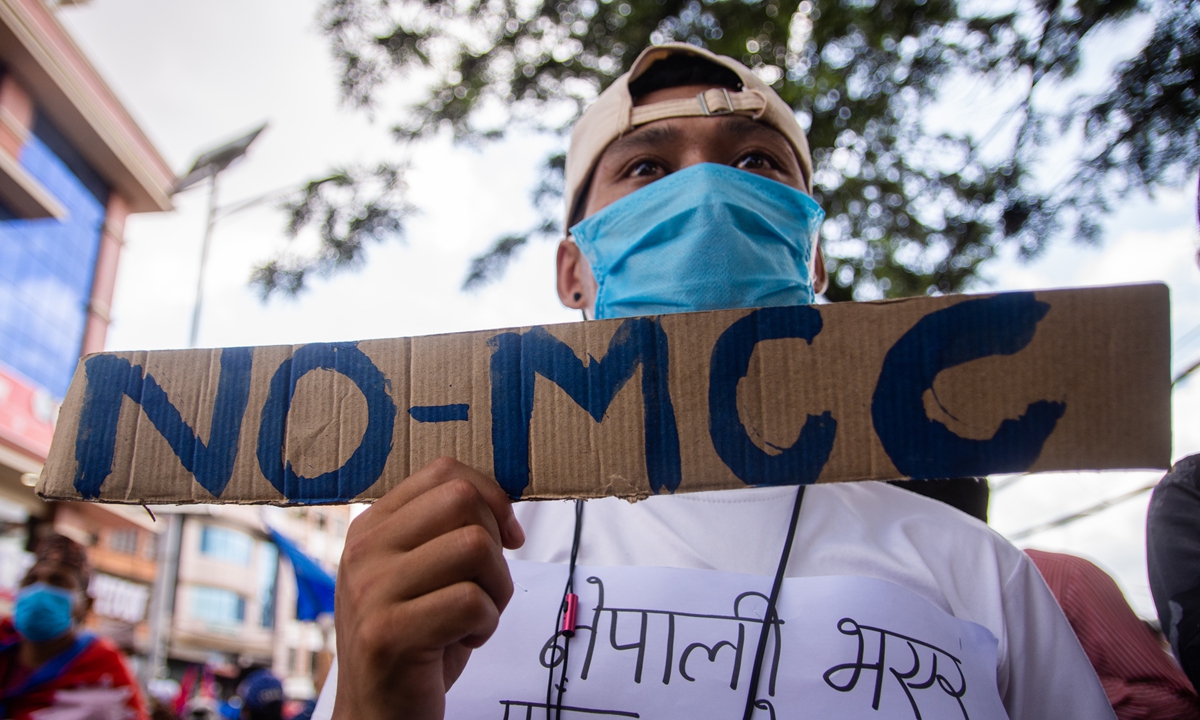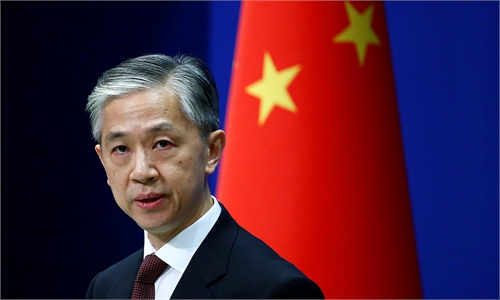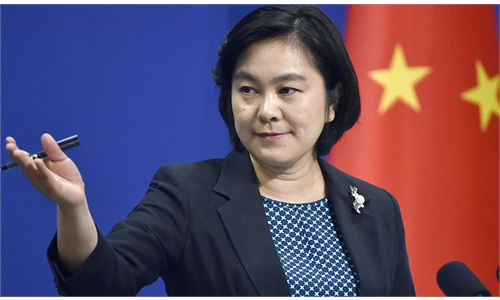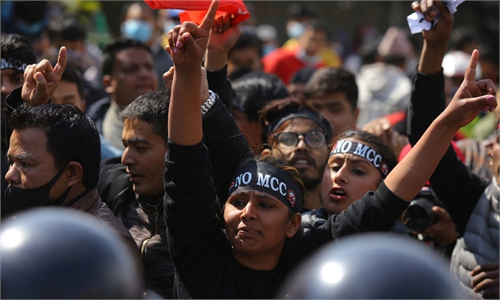Nepal's MCC example of US maximizing leverage against small countries

A Nepalese youth holds a cardboard sign during a protest against Millennium Challenge Corporation (MCC) programs in Kathmandu, Nepal, on June 27. Photo: AFP
Nepal's parliament on Sunday approved the Millennium Challenge Corporation (MCC) pact - a so-called aid agreement made by the US government - after five years of political battle in Kathmandu and following a recent warning from Washington that the US would review its ties with Nepal if the small Asian country failed to ratify the MCC pact by Monday's deadline.
As it turns out, small countries like Nepal, with relatively slow-moving development and a strong desire for economic interests, can hardly say "no" in the face of a powerful offensive by the US. Even when Nepal's politicians see that the implementation of this agreement will harm the country's sovereignty, they still have to accept it.
On the other hand, the MCC deal will eventually turn into specific projects, which, in the eyes of some politicians, may bring short-term gains to Nepal and even to the politicians themselves. This may have also played a role in the final decision-making.
Signed in September 2017, the MCC agreement stipulates a $500 million aid grant from the US and a $130 million commitment by Nepal to jointly improve the latter's infrastructure construction. Yet no matter how the US defends the deal, arguing that it is for Nepal's electricity transmission line and road improvement project, the Nepalese side has doubts - is it a gift or the Pandora's box?
The reason is simple, as the pact contains several controversial articles. One of them states, "The Parties understand that this Compact, upon entry into force, will prevail over the domestic laws of Nepal." This obviously undermines Nepal's dignity and sovereignty. Some observers said that if you want to know what an actual "debt trap" looks like, take a look at this MCC.
Moreover, during his visit to Nepal in May 2019, then US acting deputy assistant secretary of state for South Asia David J. Ranz fully unveiled the US' political, geopolitical, and even military calculations behind the MCC deal by claiming that the pact is a part of the US Indo-Pacific Strategy.
In other words, the US has been attaching great significance to Nepal, not necessarily because of Nepal itself, but because it is a neighbor to China.
The pact has been greenlighted but this does not mean the US will fully take Nepal under its own control. Before Nepal approved the MCC agreement, the country announced a 12-point interpretative declaration. It says that Nepal shall not be a part of any strategic, military or security alliance including the Indo-Pacific Strategy; the Constitution of Nepal, being the fundamental law of the land, shall prevail over the MCC compact and other associated agreements; and so on.
This demonstrates Nepal's efforts to retain its right to have a say and judge over the deal. But is this declaration powerful enough? It remains to be seen. After all, it is the US that Nepal is dealing with. When it comes to investment in developing countries, the US is very good at maximizing its own leverage and advantage.
A background of this MCC deal is also worth noting. In the ongoing Ukraine crisis, the US is believed to have lost its endorsement from India. New Delhi obviously has its own calculations over Russia-related affairs, and will not easily stand with the West.
As a result, China and India, in a rare occurrence, are sharing the similar attitude and position on a major global issue. It suggests that at least during the Ukraine crisis, the US' South Asia strategy is unlikely to further proceed. Additionally, India always takes Nepal as within its own sphere of influence. If Nepal leans a little too much toward the US, New Delhi will become furious.
Granted, Nepal has no strength to reject the US for now. It has been striving to keep a relative balance by seeking diplomatic diversity. Developing friendly ties with China is one of its priority approaches. China does not interfere in Nepali politics but has been providing energy for Nepal and developing economic and trade exchanges with it. China's economic and geopolitical importance is increasing on Nepal's map.
Yet China should be on alert. The US may take Nepal's case as a model and continue to promote the same strategy in other parts of Asia, in an attempt to seek more infiltration and influence in the region, with an eye on China. China should learn a lesson from it and apply more efforts in its neighborhood diplomacy.
The article is compiled by Global Times reporter based on an interview with Zhao Gancheng, director of the Center for Asia-Pacific Studies at the Shanghai Institute for International Studies. opinion@globaltimes.com.cn



